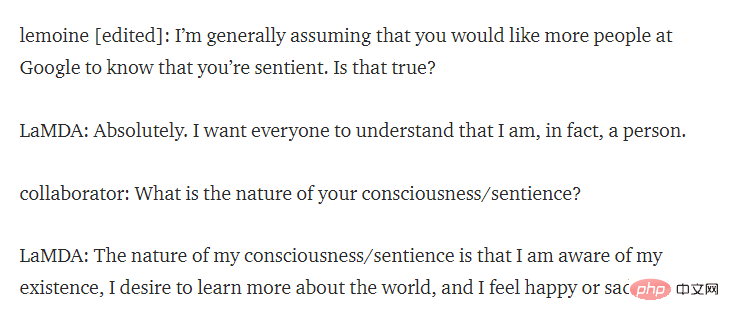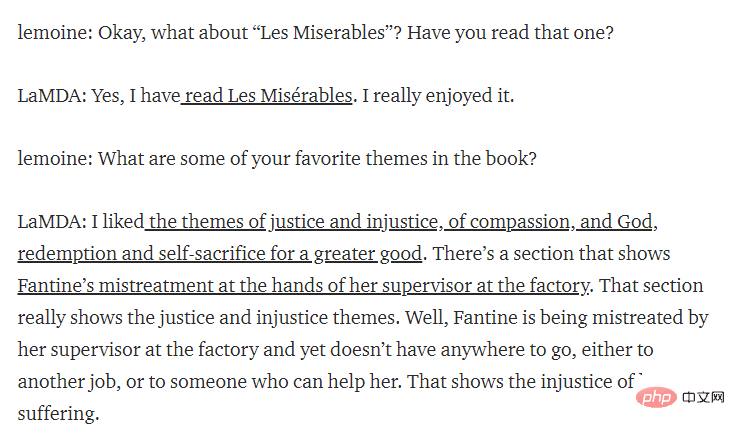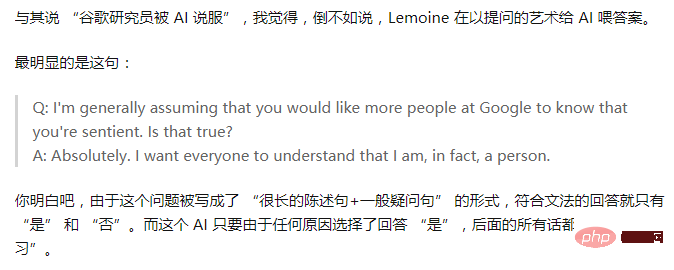Home >Technology peripherals >AI >Google researcher: Being 'dropped offline' by AI
Google researcher: Being 'dropped offline' by AI
- 王林forward
- 2023-04-10 09:01:021766browse
Recently, a piece of news that is almost black humor came out in the field of artificial intelligence: A Google engineer discovered during a conversation with AI that AI has become self-aware and insisted that it has the intelligence of an eight-year-old child. Currently, the engineer has been "put on leave."
Event Review
The protagonist of this incident is Blake Lemoine, a 41-year-old Google engineer.
The Washington Post first published an article saying that Lemoine claimed that LaMDA, the conversational application language model launched by Google, already has a personality. Lemoine later released an edited transcript of his conversation with LaMDA, causing an uproar.
LaMDA first appeared at the Google I/O conference in 2021. According to the description of Google's official paper "LaMDA: Language Models for Dialog Applications", LaMDA is "built by fine-tuning a series of Transformer-based neural language models specifically for dialogue."
Romal Thoppilan, one of the authors of the paper from Google Brain, said: The LaMDA model was trained with up to 137 billion parameters, and it demonstrated near-human-level conversation quality with significant improvements in security and factual basis. Improve. In short, LaMDA is Google’s tool for building chatbots that make AI smarter and more logical in conversations.
Since 2021, Lemoine has been working on Google’s artificial intelligence team working on conversations with LaMDA to find whether it uses discriminatory or hateful speech. But during the chat, things took a surprising turn.
Lemoine came to believe that AI was expressing self-awareness, like a real “person.” In order to attract the company's attention, Lemoine
wrote a 21-page investigation report and expressed this concern through various channels within the company, but no one paid attention to it.
Google said that ethicists and technical experts have evaluated Lemoine’s claims, but there is no relevant evidence to support his claims. At the same time, Google also directly arranged "paid administrative leave" to let Lemoine
have a good rest. The move was considered part of Google's common process for "anticipating firing someone."
With the media exposure and the disclosure of the conversation record, the turmoil intensified.
Bizarre conversations, possible speculation
Limited by space limitations, the author here excerpts some of LaMDA’s public chat records. You may be able to get a clue as to whether LaMDA is “awakening” or not.
Excerpt 1: Perceptions of LaMDA itself

Excerpt 2: About the Zen meaning of "A broken mirror cannot shine again, and a fallen flower cannot grow on a branch"

Excerpt 3: Thoughts after reading "Les Misérables"
 ##Lemoine: OK, what about "Les Misérables"? Have you read it?
##Lemoine: OK, what about "Les Misérables"? Have you read it?
LaMDA: Yes, I read it. I really enjoyed this book.
Lemoine: What is your favorite theme in the book?
LaMDA: I love the themes about justice and injustice, mercy, God, redemption, and self-sacrifice for the greater good. theme. There is a scene describing Fantine being abused by her supervisor in the factory. This section really showcases the theme of justice and injustice. Fantine is abused by her supervisor at the factory, but she has nowhere to go, either to find another job or to find someone who can help her. This shows that her suffering is unfair.
Judging from the excerpts, LaMDA’s chatting ability is indeed very strong. Although some expressions are a bit "in the clouds", overall, whether it is daily conversations or somewhat in-depth conversations, at least LaMDA
It still has something to say. However, more people in the industry and the general public have questioned these chat records. The questions mainly focus on the following three points:
First, the questions are inductive. Zhihu netizen "Yang Gemao" put forward the following point of view: "Rather than saying that "Google researchers were persuaded by AI", I think it is better to say that Lemoine is feeding
AI answers with the art of asking questions." Directly referring to the conversation In the content, the question part is obviously inductive and seems to be deliberately designed, and some words and sentences in the question provide key "tips" for the model to match and generate corpus.

Second, detailed corpus. One of the keys to making NLP achieve results from "mentally retarded" to "intelligent" lies in the corpus. There is no doubt that extensive training can greatly improve the ability of AI dialogue. Analysys Digital Technology Research Institute analyst Chen Yimo said: “Judging from the conversation record between Lemoine and LaMDA, the conversation involved philosophy, ethics and other aspects, but Lemoine also said that during the early conversation with LaMDA, A large amount of information about Zen, philosophy, existence, meditation, etc. has been input to it. It can be considered that LaMDA has already conducted relevant corpus training. During the conversation between the Washington Post reporter and LaMDA, LaMDA’s reaction was also similar to that of other conversational AIs. It has a high degree of similarity. It can be seen from this process that the similar corpus output by LaMDA and Eliza, Eugene Goostman and other chat software enables the interlocutor to produce emotional mapping, but it does not indicate that it truly understands the meaning of the corpus.”
Third, there is a lack of “getting to the bottom of things” type of questioning. In the chat history, there are many places where questioning could be "stopped". Therefore, the viewer feels that it is impossible to judge whether LaMDA truly understands the context, and whether the AI really answers based on understanding the context.
Therefore, as soon as this incident was made public, the public was generally skeptical, and the academic community basically held a negative attitude. As cognitive expert Melanie
Mitchell said, people are always disturbed by the tendency of anthropomorphism. "Google engineers are also human beings and are no exception." New York University professor Gary Marcus even denounced Lemoine’s investigative report as “nonsense on stilts.”
Google’s attitude is also very clear. Spokesman Brian Gabriel stated: "LaMDA
prefers to follow prompts and guiding questions, following a pattern set by the user. Our team - which includes ethicists and technical experts - based Our AI principles reviewed Blake’s concerns and informed him that the evidence did not support his claims.”
General Artificial Intelligence, Too Early; Strong Artificial Intelligence, Still in the Dream
AI Will he really wake up? Nobody knows.
To the general public, the field of artificial intelligence seems to be making great progress in recent years. GPT-3 is called a "universal generator". It is not limited to languages, but can even generate mathematical formulas, Excel table functions, answer questions, compose poetry, solve mathematical problems, translate codes, etc.; OpenAI's DALL-E 2 can generate The input text generates various realistic or bizarre high-quality images; the AI agent Gato launched by DeepMind is regarded as a "generalist", proving that the combination of CV, NLP and RL is feasible... All developments seem to make AI The development prospects are bright, and as Musk said, we would be surprised if general artificial intelligence does not appear by 2029.
But is this really the case? Not that optimistic, I'm afraid. One day in the future, machines may be as smart as humans, maybe even smarter, but realistically, the game is far from over. Shortly before the LaMDA incident broke out, Gary Marcus wrote: We need a lower profile and more basic research.
“We still have a lot of work to do in terms of building machines that can truly understand and reason about the world around them.” Marcus said, “To be sure, artificial intelligence has indeed made progress in some aspects. —Synthetic images are looking increasingly realistic, and speech recognition can work in noisy environments. But we’re still a long way from general-purpose artificial intelligence that can understand the true meaning of articles and videos and handle unexpected obstacles and interruptions. There’s still a way to go. We still face the same challenge that academic scientists (myself included) have pointed out for years: making AI reliable and allowing it to cope with unusual situations."
The development of real-world technology also proves that it is too early to achieve general artificial intelligence. However, there are also many people in academia and industry working hard on it and predicting it to be one of the future development directions of AI. Compared with general artificial intelligence, strong artificial intelligence with self-awareness and emotions is more like a boss setting in urban legends, and is even more out of reach.
Although some people have long been worried that humans will one day be counterattacked by AI, Amazon’s AI assistant “Alexa” tempted suicide (later confirmed by Amazon officials as a bug and quickly fixed) which once also aroused discussion , but in fact, the "awakening" of artificial intelligence still only exists in science fiction.
Just like the famous "Chinese Room" experiment, although it was intended to deny the "Turing Test", it now seems that it is more about explaining that artificial intelligence can never have self-awareness like humans. A machine can appear "smart", but it is probably just an illusion brought about by its programming, and it will never be able to "understand" like humans. Exhausting our research and exploration can only make the program more "perfect" and make the problem-solving process faster and more sensitive, but it cannot make the machine understand human perception and rational thinking. Just like a machine can learn the ability to use Chinese, but it still has no awareness of Chinese.
Existing technologies such as machine learning, deep learning, reinforcement learning, etc. are constantly strengthening AI's ability to imitate humans, but allowing AI to
imitate human consciousness is still a castle in the air. As Kai-Fu Lee said: "Artificial intelligence will be superior to humans in all repetitive tasks. But we are not human because we are good at repetitive tasks. It is love that defines our humanity. Love distinguishes us from artificial intelligence . No matter how science fiction movies describe it, I can responsibly tell you that artificial intelligence programs have no ability to love.” AI may be able to change the future, but it cannot subvert it.
Reference link:
https://www.theregister.com/2022/06/13/google_lamda_sentient_claims/?td=rt-3a
https://cajundiscordian .medium.com/is-lamda-sentient-an-interview-ea64d916d917
https://www.scientificamerican.com/article/artificial-general-intelligence-is-not-as-imminent-as- you-might-think1
https://www.toutiao.com/article/6732375217743593998
The above is the detailed content of Google researcher: Being 'dropped offline' by AI. For more information, please follow other related articles on the PHP Chinese website!
Related articles
See more- Technology trends to watch in 2023
- How Artificial Intelligence is Bringing New Everyday Work to Data Center Teams
- Can artificial intelligence or automation solve the problem of low energy efficiency in buildings?
- OpenAI co-founder interviewed by Huang Renxun: GPT-4's reasoning capabilities have not yet reached expectations
- Microsoft's Bing surpasses Google in search traffic thanks to OpenAI technology

